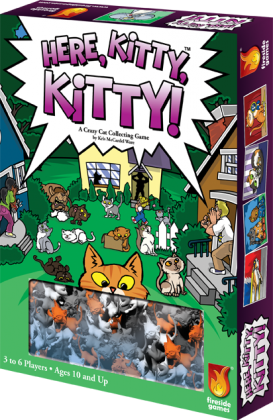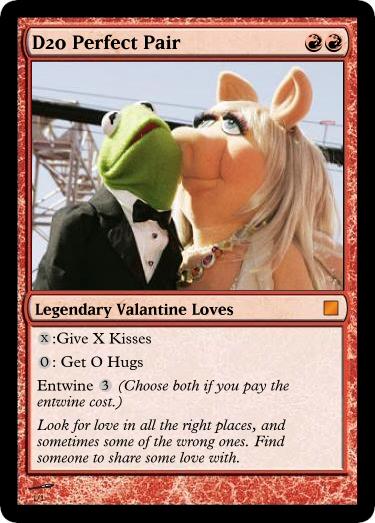Family Game Night-making a habit worth keeping.
Ok…we all know it is a painful time, going stir crazy trapped in our homes with our kids/parents, desperately hunting for things to do to make the time move a little faster without getting on each other’s nerves. So lots of us have been pulling out projects, puzzles and board games. But in a time with all the old habits thrown up in the air, can we take one of the good things, family game night, and turn it into something everyone wants to keep around?
The thing of it is that this moment we are all going through has done something interesting and important that is worth thinking about. We’ve all had to basically blow up what we thought was the way life had to operate, and when this is done, we’re gonna need to put it back together differently then it was before. So maybe, we can use this to sneak back in somethings that were just too much of a change to get everyone to buy into before.

See I own a game store, so I get to see a lot of families come in, and I know from the tips of my toes to the top of my massively in need of a haircut head (remember when we used to be able to get haircuts, in the “before times”? Ah, the exotic luxury of it.), that the families that had regular family game night were bonded in ways that were just different from everyone else. I won’t go through the details on the case for board game nights again since I did that once upon a time in my store blog, but it’s an idea that almost every parent intuitively knows about as well as they know how exquisitely impossible it is to get going once screens and phones lodge into our kids brains. Getting this “quaint” idea going, with people who are able to fill every bored moment, is almost impossible. I will also not go into the details of why I’m deeply worried about the serious issues around the “Digital Nicotine” aspects of many of the things passing through smartphones/tablets, (So I’m Addicted to Cell Phones Too, Ben Calica). However, I will say that I’m much, much more worried about the danger of the literally physical addiction aspects of smartphone/screen problems right now, to the point where they could be much more difficult to deal with. Let me be clear, I’m not Luddite guy looking to throw all the glowing Satan boxes into the river (though there have been times when I wanted to take my own kids phones and lovingly put them under the tire of my car and just drive slowly back and forth for a little bit. I will put huge money that there is not a single parent of a kid with a phone reading this that isn’t nodding right now.) For learning, for communicating with loved ones, for opening the whole world of knowledge to us, these are amazing tools. But there are thousands of really smart people out there that have been paid a great deal of money to tickle those parts of our brains that keep us coming back to give them our eyeballs, and they know where the endorphins are kept locked up in the cupboard.

So now that things have got blowed up nice and good and we are face to face to face, at least with the family that got down in the tornado cellar before the big virus twister hit, how can we turn our shelter experience into a regular family habit that becomes a regular part of our lives?
The Elements of Successful Family Game Night:
Pick Carefully: The first and most important part of a successful family game night is what game are you gonna play. When I have couples come into the store to find a game, the first thing I ask them is how do they do playing against each other or with each other. There are some people who love the joy of getting to stretch their minds and skills against each other, and others who feel picked on or condescended to or just feel under pressure to “play right” and therefore don’t feel like they like games at all. If you have a family, what are the age differences in the kids? Will the youngest feel over-matched or left out? Is it a game of speed that leaves the Grandparents feeling left out? Is the game too complicated for people to be patient to understand the rules, or too simple and feeling random for more sophisticated players.
Generally speaking, the best thing to do is to start with simpler and more successful games and then let the games get richer from there. For those who don’t like feeling left out of behind or the pressure of understanding all the nuances to be successful, look at some of the really great cooperative games. The best ones aren’t Pollyanna crunch fests, but have the game as the “bad guy” opponent and source of challenge/tension. Other things to watch for is games that involve everyone as quickly and immediately as possible. Games where one person takes their turn for 5–10 minutes while everyone else waits around tend to kill a game night but good.
The Game/Rules Master: Once you’ve selected the types of games you want, each family game night, someone should be preselected to be the Game/Rules Master. One of the things that kills games nights but good is a lot of time where everyone is trying to battle over the one rule book to figure out how the stupid game works. Most games are pretty straight forward to play after you’ve muscled through the first game, but figuring out the basic setup, object and how the game works turn to turn isn’t always obvious the first time through. The game master is the one who gets the game the day before and who goes ahead of time to set the game up and to run through a practice round or two on their own to figure out how to play the darn thing. They are gonna be the ones who explain the game play to everyone else. You can also have them be the one who picks the game for the night. But if you do so, they need to have the goal of picking a game that they think everyone would like. (If you wanna be really cool about it, have them pick a game that they think one other person in the family would most love…kid picks game that they think mom would love, mom picks game that dad would love, brother picks game for younger sister, etc. If you do that, then they feel great when they see someone else in the family love the experience. It shifts the focus outside themselves. )
Big, big hint for the Game/Rules Master when they are teaching the game!!! Have the least amount of time possible between the time you start talking about the game and everyone is starting to play. The natural tendency is to go through the whole game, but people are getting bored off their rocker listening instead of getting to it. Better to be a little more basic in your description and let people ask you if they don’t understand something, then to take a lot of time describing stuff that people probably get already. And if there are complicated variants to how something happens in a particular circumstance, just say that there are some rare exceptions and move on. Once people get into the flow, you can get to that. What you need to explain to get started is:
- Objective-i.e. how do you win the game. (Collect the most X, get to the end of the board, be the last mushroom standing..). If it is complicated, give a basic view first and point to the part of the manual that has it for people to look at. If it is super complicated and the game doesn’t come with reference cards for everybody, consider making a copy of those pages for everyone playing.
- Set up– Ideally have this already done or have the place in the rules about this underlined and ready to describe. (“everyone gets 7 cards and 3 caterpillar tokens”)
- Basic steps to a turn: What does each player do in a turn. Again, top view and let people ask you questions if they don’t get it.
- Practice round!: This is really important if you can possibly do it. Run through how the game works by having people do it, but let them know the first round doesn’t count. That way people won’t feel under pressure or get grumpy cause they “never would have done that if they understood”.
Rules of the Table
What do they say, “good fences make good neighbors.” This is more then true of the table rules for game nights. Some of these work well printed out on the table to make sure that it is fun and not hurt feelings that rule the night, and others are examples to set.
- Phone Basket: Family game night is a sacred, phone free time. Make a big deal of putting your phones in a basket and even letting other people know that this time every week is time you don’t respond unless it is an emergency. Model the hell out of this. It is like sabbath, an electronics free zone.
- Family rules: You guys own the games. If you come to a rule that you guys don’t like as a family or you prefer a different way, agree and then change it. The big stack of cash under free parking in Monopoly wasn’t in the rules originally, but we always thought the game was way better with it. )
- Smack Talk/Shaming: This is a tricky one. The shaming is obvious, but extends to telling someone that they made a stupid move…just shut that stuff down, and I’d print this rule up. The smack talk is a different issue. It can be lighthearted and part of a family/friend dynamic. (I sure did it with my best friends in high school..the epic battle on who was better, Richie Rich or Scrooge McDuck took on an epic level of smack talk that makes me smile to this day.) But we have a rule against smack talk in the store because, well, the whole idea of smack talk is to try and get just a little under someone’s skin. The problem is that with teens and tweens in particular, their job is to not show when they get feeling hurt, so someone could be really hurting someone without realizing it. So just to play it safe, we just don’t allow it in the store. This is a call you gotta make for your own family, and I don’t know em enough to know if they have a good handle on that line, but I’ll include it in the list later and you can blame me if you need “aw Ma/Dad” cover.
- Food at the Game Table: Ok..I know I just got done with this whole thing about you knowing your family best and making your own choices but, YES…food at the gaming table. Let me make this simple: Hungry=low-blood sugar=crankiness/short tempers. Keep out that bowl o’snacks. Sure, make it grapes and pretzels and not Cheetos, BBQ and powdered donuts if you care about keeping the game clean, but snack ’em up. There are reasons that the image of D&D players in their basements included boxes of pizza. 😉
- No Know-it Alls (Table Captains), or Rules Lawyers: Table Captains is usually the older sibling who understands how the game is played and starts ordering people around like they are extensions of themselves. This is most often in cooperative games. It takes away the fun of playing from the other players, even though all they think they are trying to do is help. A little talk about being their to support the other players and asking the question “would you like a suggestion” and actually waiting for the answer goes a long way.
I need a private moment with the game playing dads…(I’m gonna say something a little hard to hear. It is super likely that you are doing this too and don’t realize it. It is the single thing that makes their spouses not want to play with them. They may not get the pattern as fast cause that isn’t what they’ve done a lot, but they are pretty damn smart and it is way better to give them space to ask questions, then to over explain. It comes across as condescending and you are pushing off the person you most wanna join in.
The second type of playing to be careful of is what is called Rules Lawyer-ing. This is playing gotcha with the rules, calling someone on a mistake they made because they didn’t understand or missed a nuance of the rules. Don’t, just don’t. If someone can take a move back because they didn’t get something, let them. It is way better to play a great game and lose it, then to make someone feel like they can’t try and learn a new game because they are afraid to be made to feel stupid because they misunderstood something. - It’s Just a #%$ing Game: The slogan for the store that grace the back of our tee shirts and hoodies is a graphic representation of “Win with Grace, Lose with Style, and Play for Fun”. This is about the most important part of a good family game night. One thing to do is to make a winners trophy that rotates from player to player that is so epically stupid that it makes it clear the nature of winning and loosing in this house. (Right now, I’d probably take a roll of toilet paper and stick it on an old trophy to indicate the value of family triumph. Although that may be a little too valuable at the moment.) One word about modeling winning and loosing to small children that is a little counter intuitive. This works particularly well with coop games when the game wins. We tend to thing that acting serene and accepting a loss is what we need to model for little kids. The problem is that just make us alien beings to them, ones who just don’t have the same emotions they do. It is actually better to show starting to get frustrated and then taking a moment to breath or in some other way calm down and get to that “ah well” state. That way we are modeling something for them that is much more accessible, how to have those feelings and then manage them. Even with the older kids, if you get frustrated in a game, say so, and then talk it out. As adults, we often get frustrated with games, particularly if the rules are complex and we feel like we have more important things to be doing, and if this isn’t fun, then why are we bothering. Believe me, the kids will pick up on that frustration and walking away. But what we are walking away from is working out a problem that they were part of rather then expressing our feelings and trying to work it out. Much better to stick it out and work it though on this much safer ground, so when it is much bigger issues, you’ve had some successful practice rounds. I think this may be the very heart of why those families who got family game night into their regular pattern of life have this different feeling about them.
That seems like as good a note as any to end this on. This seems like play time, but it is some of the best parenting time that you can invest in. It isn’t easy, and is kind of like teaching a teenage dog to do new tricks (they already know all the tricks, and why should they listen to you anyway, dumb dad/mom dogs), but it is worth it. And this is an absolutely unique time to take the shattered pieces of the old life and maybe build something a little better from the pieces.
The Family Game Night rules
- Electronics Free Zone:
No phones at the table, (unless the game requires it.) - No Commenting on someone else’s dumb (or more clever then you realized) moves.
- No Insulting/Shaming other players, or teaming up on anybody besides Dad. (Ok..he deserves it.)
- No Rules Lawyer-ing…if someone makes a dumb mistake, let ’em take it back already.
- Don’t Cheat: Losing with grace is pretty cool and you learn and get better. Cheating just robs you of having people believe you when you win later.
- Oh yeah, remember the three magic words:
It’s A Game.
 Win with Grace, Lose with Style, and Play for Fun
Win with Grace, Lose with Style, and Play for Fun



 From the makers of Dr. Eureka and Photosynthesis comes a game that is like a 3d puzzle version of King domino (another recommended game)…simple yet pretty interesting. see video review
From the makers of Dr. Eureka and Photosynthesis comes a game that is like a 3d puzzle version of King domino (another recommended game)…simple yet pretty interesting. see video review  Godsforge was Ben’s fav game at the last big game store owners show. It’s kind of like Magic meets Yatzee. Extremely well designed and just a ton of fun. Extremely highly recommended and a great game for magic players when you don’t know what they already have.
Godsforge was Ben’s fav game at the last big game store owners show. It’s kind of like Magic meets Yatzee. Extremely well designed and just a ton of fun. Extremely highly recommended and a great game for magic players when you don’t know what they already have. This is one of the first games I’ve seen where people can just enter and leave the game without it being a problem. Sort of like town building Tertris, the goal is to get the best score by making interesting combos of buildings with the block that the next person in line picks in turn. Want a better score, stick around a do another card. Need to go check the pies, let someone else hop in. The game is great and it is easy to imagine it being played by different people all day, with the top score on the fridge whiteboard.
This is one of the first games I’ve seen where people can just enter and leave the game without it being a problem. Sort of like town building Tertris, the goal is to get the best score by making interesting combos of buildings with the block that the next person in line picks in turn. Want a better score, stick around a do another card. Need to go check the pies, let someone else hop in. The game is great and it is easy to imagine it being played by different people all day, with the top score on the fridge whiteboard. When the all time fav game in the store (Cover Your Assets) gets an “absurdly ruthless spinoff”, you think it isn’t going on our recommended list? Preview
When the all time fav game in the store (Cover Your Assets) gets an “absurdly ruthless spinoff”, you think it isn’t going on our recommended list? Preview 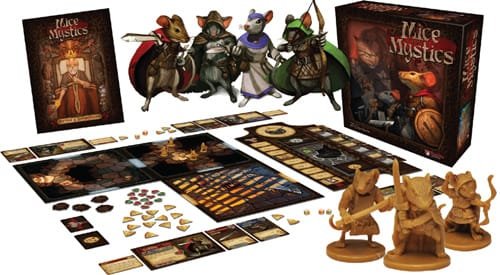 Redwall meets self running D&D in this coop family game that is great to play with parents and kids together. More info
Redwall meets self running D&D in this coop family game that is great to play with parents and kids together. More info 
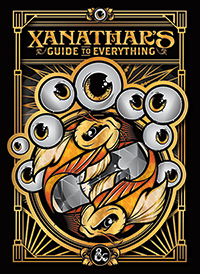

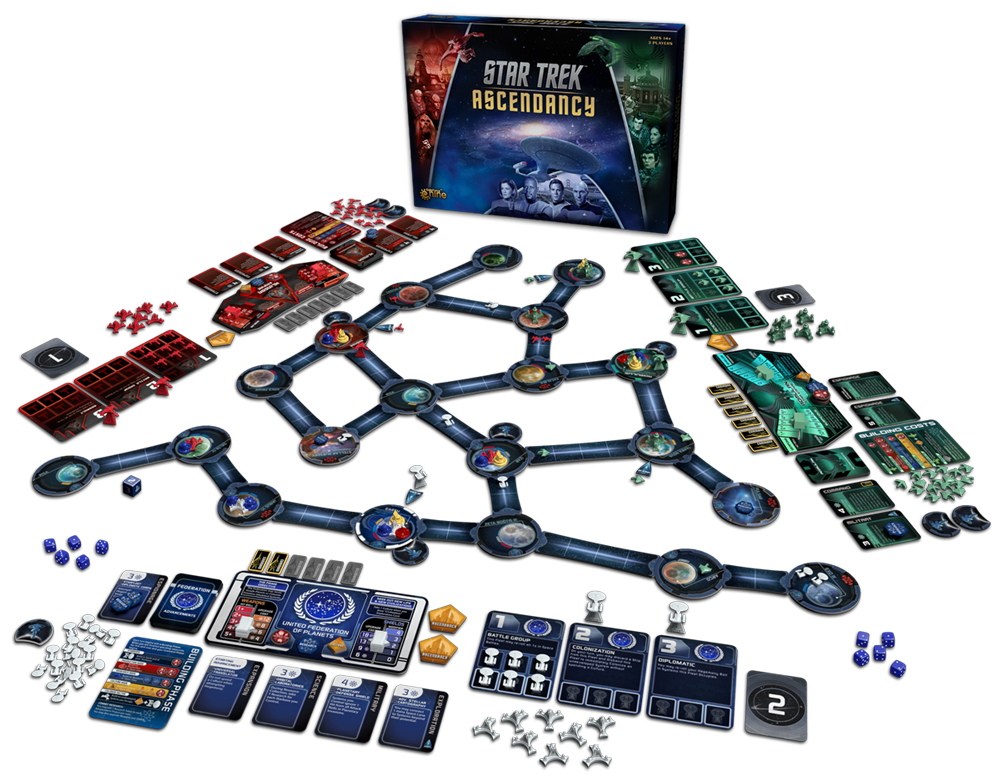



 carry it. That I called him back as soon as I could and ordered twelve, should give you a notion of how much we liked it. This is a blend of Star Realms like deck-building with a Risk like hunting down of the five spies of each of your opponents.
carry it. That I called him back as soon as I could and ordered twelve, should give you a notion of how much we liked it. This is a blend of Star Realms like deck-building with a Risk like hunting down of the five spies of each of your opponents.
 Brix: The best Tic Tac Toe variant since Niya. Think Connect 4 with pieces that contain one of each color glued together. Good two player game…simple to understand…tricky to play. $19.99
Brix: The best Tic Tac Toe variant since Niya. Think Connect 4 with pieces that contain one of each color glued together. Good two player game…simple to understand…tricky to play. $19.99
